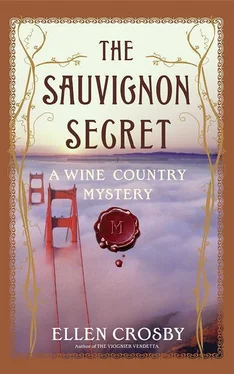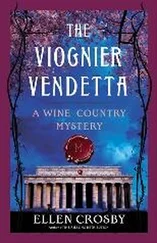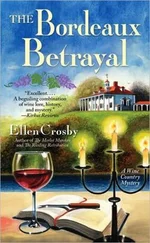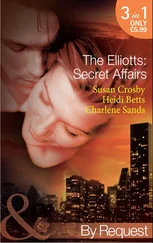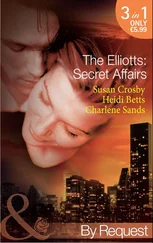I pulled up the desk chair and sat next to the window for a long time, thinking about Quinn and my life back home and where things were going with us. After a while I remembered his promise to call after he talked to Allen Cantor. I found my phone in my purse, still turned to silent mode from the restaurant, and saw the missed call just before midnight.
“Sorry it’s so late. I’m sure you’re asleep by now. I got hold of Allen.” His voice was terse and matter-of-fact. “He says he’ll see us tomorrow. We’ve got to do some driving so I’ll pick you up at seven thirty outside the hotel.”
It was just after three in the morning. Quinn would be waiting for me in less than four and a half hours. I pulled the curtains shut and climbed back into bed. But my mind kept racing with edgy, just-out-of-reach thoughts.
I didn’t fall asleep until nearly dawn.
I woke to what sounded like drums pounding. Pale streaks of daylight filtered through the cracks of the curtains and striped my bed. I threw back the duvet, grabbed my cane, and went over to the connecting door to Pépé’s room. He stood there, immaculate in a double-breasted cream-colored linen suit, his gray hair slicked back with water, ready to take on the world. I’d caught a glimpse of myself in the mirror above the dresser before I opened the door. My hair was wild-looking and stuck out in weird clumps, and my eyes looked like two bruises, since I’d forgotten to take off my mascara before I went to bed.
“What time is it?” I felt breathless.
“Good morning, chérie ,” he said. “It’s seven o’clock. The limousine taking me to the Bohemian Grove is waiting downstairs. I wanted to say goodbye before I left. Sorry to wake you up.”
I’d set my phone alarm for six thirty. When had I shut it off?
“Seven? Dammit to hell. I’m late.”
“Order anything you like for breakfast.” Pépé seemed to have decided to ignore my train-wrecked appearance and unvarnished language. “I’ll see you tomorrow evening in Calistoga at Robert’s. He’s giving us his guesthouse, so we’ll have a place of our own.”
Meaning I wouldn’t terrify Robert Sanábria if he saw me slipping into the bathroom first thing in the morning looking like I did just now.
“I’m sorry, Pépé, I didn’t mean to bite your head off. I’ll be there tomorrow. Quinn’s coming in half an hour and I overslept. I’ll get something to eat on the road.”
“There is coffee in the pot in my room. Help yourself. You look like you could use a cup. Or perhaps the whole pot,” he said. “Where are you and Quinn going?”
“I don’t know. He promised to show me around.”
It happened to be the truth and I was glad I didn’t have to lie to my grandfather. For now I didn’t want him knowing about meeting Allen Cantor to check up on Teddy Fargo, going behind Charles’s back to see what else I could learn about this mission he’d sent me on.
“Will you and Quinn visit Rose Hill Vineyard today or tomorrow?” he asked.
“Probably tomorrow.”
“Thank you for doing this,” he said. “I spoke to Juliette last night. Charles isn’t doing well. She’s upset.”
He sounded upset, too. I wondered who had called whom.
“Not well.” I repeated his words. “Mentally? Or physically?”
“Both, I think.”
Our eyes met. “Are you talking about him or her?”
“Why, Charles, of course.”
“And Juliette?”
He sighed. “Yes, perhaps her, too.”
“What’s wrong, Pépé?”
He looked away. “I don’t know. Something happened to Juliette and she’s changed. I can’t explain it. Lately she’s so high-strung. It takes so little to set her off.”
Just how often did they talk to each other?
“How long has that been going on?” I kept my voice noncommittal.
“A while.” He fiddled with his perfectly knotted tie. “I never knew her to be melancholy, or moody like this before.”
“You can’t fix her problems. Or her marriage.”
“I know that.” His voice was sharp. “All I could do was tell her everything would be all right.”
“Do you believe that?”
“No,” he said, “I don’t.”
“Me, neither.”
After he left, I realized I’d forgotten to wish him good luck on his talk in Monte Rio.
Quinn called my cell when I was in the shower. I grabbed it off the sink ledge while I was still dripping wet, just before it went to voice mail.
“I’m gonna be late,” he said. “Traffic on the bridge.”
“Don’t rush.” I swiped a towel and tried to dry the phone. “Overslept, did you?”
“Absolutely not. I just don’t want you to rush.”
I heard him chuckle. “I’ll call you when I’m about ten minutes away. What are you doing? Taking a shower?”
“How could I be taking a shower and talking to you?”
“Took you too long to answer. Splish-splash go back to taking your bath,” he said and disconnected.
He picked me up just before eight in a black Porsche with the top down.
“Nice wheels,” I said as he leaned over to open the door for me.
“They’re Harmony’s,” he said. “I’m car-sitting, too.”
I felt an unwelcome flash of jealousy. “Harmony?”
He glanced over at me and smiled. “Friend of my mother’s. She’s like an aunt to me. A child of the sixties. Flower power, hippies, Summer of Love, the whole enchilada. I think her real name is Penelope. She’s an artist … hence the houseboat in Sausalito.”
“And the Porsche?”
“She likes cool cars that go fast.”
“I’d love to meet her.”
“She’s in Italy at the moment. Been gone since June. Went to Stonehenge for the summer solstice and did that Druid jumping-around stuff they do.”
“Don’t be such a cynic. It’s not jumping around. They dance and celebrate summer and light bonfires,” I said. “What’s in Italy?”
“Good food, great wine … and Italian men.”
“Then I’d really love to meet her.”
He grinned. “Yeah, I bet you would.”
We were zipping down vertigo-inducing streets—Quinn somehow timed it so he hit all the green lights—with the wind riffing my hair and cutting in behind my sunglasses. Since yesterday I’d been trying to put my finger on what felt so different about San Francisco—aside from its obvious unique geography—why it was unlike anyplace on the East Coast or even all the European cities I knew.
As we drove past Union Square, with its startling tropical palm trees amid skyscrapers, and continued down Mason Street, Quinn rattled off names of the bubbling ethnic stew of neighborhoods, waving an arm to indicate roughly where they were—the Tender-loin, Japantown, Little Saigon—and I finally realized what it was: that despite the old-world roots and history of the city, it looked east to Asia, not west to Europe. Now I understood why Quinn loved it, why he belonged here. It was the perfect foil for his personality; San Francisco still thrummed with the gold rush brashness that grew it big, and the Russian roulette edginess of being built on earthquake fault lines where everyone knew it was a matter of when, not if. Even yesterday, I’d felt an odd little shifting when I’d been in the hotel, finally realizing that it wasn’t traffic thundering along Nob Hill.
Quinn caught me staring at him and said, “What?”
“Nothing,” I said. “Just that I like San Francisco.”
He grinned and reached over to squeeze my hand. “You ain’t seen nothing yet, honey. There’s a map of California in the glove compartment. Get it out and I’ll give you a geography lesson.”
I found the map, opened it, and refolded it to show San Francisco and the Bay Area.
“The marine layer’s pretty intense this morning,” he said. “So we’ll head up the Bay side of the Peninsula and go by Sunnyvale, Cupertino—that’s Silicon Valley to you. Highway 1, the Pacific Coast Highway, is beautiful, but it takes longer and it’s dangerous in the fog.”
Читать дальше
